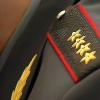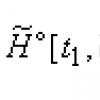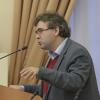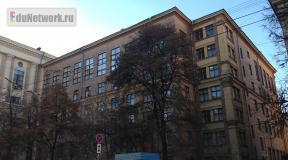Russian State Humanitarian University . RSU - Russian State Humanitarian University Education RSU
I have only been studying at this university for 1 semester, but I already have a certain idea about it. Overall - great. I don’t regret that I entered here (I had a choice: a budget at the Russian State University for the Humanities or a 75% discount at the Higher School of Economics).
Now, in order, about all the pros and cons.
ADMISSION.
The admissions office is staffed by students, in different rooms for different majors. There is a sign with the numbers of the required offices both on the website and in the lobby of any building. They fill out quickly, without problems, without unnecessary questions. On the day of submission, I indicated the availability of additional certificates to receive additional points, but did not bring copies of the documents; they called me in the evening and reminded me of this, asking me to bring them.
FRESH-YEAR MEETING.
All information necessary for first-year students is posted on the website at the end of August. A meeting takes place at which the essence of the training is explained. Each direction has its own curator of teachers and a team leader of students (but this does not mean that you can only contact them with questions, absolutely everyone is open: both students and teachers).
BUILDING.
I would like to pay special attention to the buildings on the street. Chayanova, 15 and st. Miusskaya, 6. Almost all the buildings are located in one place, which is very convenient. But they definitely require repairs (and not even cosmetic ones). I wouldn’t say that the plaster is falling on my head, but in most classrooms chairs are broken or missing, desks sometimes shake, the toilets often have no paper, soap and paper towels, and they themselves are not in the best condition. But here the complaint is not against IL specifically, but against the Russian State University for the Humanities as a whole. There is a beautiful building on the street. Nikolskaya, 15, there is a faculty of historians and archivists. There is also a printing yard there, the first printing house, founded in 1553 under Ivan the Terrible, and RSUH students can visit such a historical place for free and without queues. There is also a building for computer scientists somewhere in the middle of nowhere (no one knows where it is except themselves).
DORMITORY.
It is almost impossible to get a hostel in the 1st year - you need to enroll on a budget at a minimum. They give places in the future if a person still needs and/or lives in other hostels (their prices are higher). I haven’t been in the building itself, I can only say that it is located near the Academician Yangel Street metro station.
ORGANIZATION.
IL is considered the faculty with the best organization, but even there there are problems. This:
1. Schedule. The schedule is unstable, something changes every two or three weeks, something is removed, something is added, so you need to check it every week. Sometimes the schedule does not correspond to reality, for example, there are two pairs of subject N, of which only one will be taught due to the division into groups (but on the other hand, something is analyzed in more depth, since there are fewer students).
2. The working hours of teachers, departments or the dean’s office may not seem convenient to everyone; sometimes you have to run after them.
However, as I noted above, IL is the most organized place, so I’m even afraid to imagine what’s going on in other faculties.
EDUCATION.
In the 1st year we were given most of the general education subjects (economics, philosophy, history of Russia and history of the world, etc.), which, on the one hand, is very good, since many specialized subjects will follow. On the other hand, many people cannot stand this boredom and leave without waiting for something interesting. But specialized ones are also present, and are taught at a very high level (this also works in the opposite direction - there are many requirements for a good grade in the exam).
SESSION.
There is no session. That's exactly it. The subject is over - you pass it. Ended in mid-October? It’s not a question - here’s a test, decide, give me a record book. This system has its pros and cons: you can immediately be free from some tests, or you can arrive for classes at 10 a.m. in mid-January, and after that you can also manage to pass the exam.
CORRUPTION.
No and it cannot be.
LANGUAGE.
Separate item for language. They are taught to a very high level. Everyone comes out with knowledge, but for the sake of this knowledge you will have to work very hard, because they ask and demand a lot. The advantage is that the student himself chooses the language he wants to study (from those offered this year), priority goes to high-scoring students. Oriental languages and rare European languages are taught - in a word, for every taste.
COUPLES.
Lectures and seminars are open, i.e. When studying at IL, you can come and listen to what they teach at another department, if it’s interesting. No one will kick you out, the main thing is to warn the teacher. Most seminars are held in groups, but teachers allow you to go with the one you are comfortable with.
COMPETITION AND PASSING SCORE.
The competition and passing scores can be viewed on the university website. But I want to explain why it is so big: there are a lot of applications and very few budget places. That's quite a bit. There is practically no competition for the scarf.
Points are a different story altogether. They change in very large leaps (compare: 2014 - 244; 2015 - 262; 2017 - 274 in the second waves). A couple more years, and the IL will also only be accepted for Olympiads.
EXTRA-CURRICULAR ACTIVITIES.
There are many sections and clubs for every taste - sports, intellectual games, KVN, choir (in my opinion, there are even two of them), theater club. There are student councils. Many events are organized, all sorts of festivals, competitions, and various public lectures and performances are often held. Anyone will find something to keep themselves busy.
I would also really like to note the warm relationship with the teachers. Almost immediately, upon entering IL, you understand that no one is your enemy here, everyone will help, answer questions, tell you what to do. And I think this is very important and very valuable.
Let me remind you once again that the review is specifically about IL, and I am delighted with it.
Result: IL - 10/10, RSUH (overall) - 7/10.
|
|
The "RGGU" request is redirected here. See also other meanings. Russian State Humanitarian University (RGGU) Founded 1991 Rector ... Wikipedia
Russian State University for the Humanities (Miusskaya Square, 6). Established in March 1991 on the basis of the Moscow Historical and Archival Institute (MGIAI, since 1932; founded in 1930 as the Institute of Archives). The history of the institute is connected with the activities of academicians S.B. Veselovsky, Yu.V. Gauthier,... ... Moscow (encyclopedia)
Russian State Humanitarian University- Russian State Humanitarian University (RGGU) ... Russian spelling dictionary
Russian State Humanitarian University- Moscow, Miusskaya sq., 6. Psychology, social anthropology. (Bim Bad B.M. Pedagogical Encyclopedic Dictionary. M., 2002. P. 473) See also Universities Ch489.514(2)7 ... Pedagogical terminological dictionary
- (, 6). Established in March 1991 on the basis of the Moscow Historical and Archival Institute (MGIAI, since 1932; founded in 1930 as the Institute of Archives). The history of the institute is connected with the activities of academicians, Yu.V. Gauthier, L.V. Cherepnin, professors... ... Moscow (encyclopedia)
Moscow Agricultural Academy named after Kliment Arkadyevich Timiryazev (RGAU Moscow Agricultural Academy named after K. A. Timiryazev) ... Wikipedia
- (RGGMU) Year of foundation 1930 ... Wikipedia
The style of this article is non-encyclopedic or violates the norms of the Russian language. The article should be corrected according to the stylistic rules of Wikipedia... Wikipedia
- (MGRI RGGRU) Former names MGGRU, MGGA, MGRI Motto Mente et Malleo (with mind and hammer) ... Wikipedia
- (Russian State Pedagogical University named after A.I. Herzen) ... Wikipedia
Books
- Russian-Azerbaijani relations. The end of the 20th - the beginning of the 21st century, Pivovar E.I. , In the monograph, for the first time, based on a wide range of sources, the twenty-year history of the formation and development of relations between the Russian Federation and the Republic of Azerbaijan is recreated, both on... Series: Publisher: Russian State Humanitarian University (RGGU),
- "Walls and Bridges" - III. History of the emergence and development of the idea of interdisciplinarity. Proceedings of the International Scientific Conference, Moscow, Russian State University for the Humanities, April 25-26, 2014. Grif MO RF, Savelyeva Irina Maksimovna, The collection includes materials from the III Annual International Scientific Conference 171; Walls and Bridges 187;: the history of the emergence and development of the idea of interdisciplinarity, which took place in the Russian... Series: Publisher:
schedule Operating mode:
Mon., Tue., Wed., Thu., Fri. from 09:00 to 17:45
Latest reviews from RSUH
Dmitry Rasov 21:00 05/31/2013The choice for this university fell when choosing a specialty. Literally everything came together - the specialty, the curriculum, the passing grades and the cost of training in the commercial department. I can’t say that it was incredibly difficult to get in, but the competition was quite decent. Both the points received for the Unified State Exam and the internal entrance exam were of great importance (not all faculties have such an exam, moreover, it is no more difficult than the Unified State Exam and is compiled exclusively about the school curriculum...
Elena Borzova 13:13 04/27/2013
My husband studied at this university. I studied full-time. RSUH has its main building in Moscow, and a branch in the Moscow region, the village of Fryazino; training took place in both buildings. I studied for a fee, it is very difficult to enroll in the free department, there is a big competition, about 30 people per place, and there are a huge number of people who want to get into this university, also the Faculty of Law is very popular at the moment. As for the male teaching staff...
Gallery of the Russian State University for the Humanities



general information
Federal State Budgetary Educational Institution of Higher Education "Russian State Humanitarian University"
University Reviews
Moscow universities that have budget places in the field of Linguistics. Admission 2013: list of Unified State Examinations, passing score, number of budget places and tuition fees.
About RSUH
The Russian State University for the Humanities is a relatively young university, which during its existence has already become a leader among other universities for the humanities and has reached the peak of popularity among applicants.
Education at the Russian State University for the Humanities
The university implements educational programs for professional education at all levels.
Students can receive secondary vocational education at the University's Humanitarian College. Basic training in secondary vocational education is offered in the following specialties: “Design” (by industry), “Tourism”, “Finance”, “Technique and art of photography”, “Advertising”, “Documentation management and archival science”; in-depth preparation of secondary vocational education – in the specialty “Law and organization of social security”
Graduates of the 9th and 11th grades are admitted to the Humanitarian College. Training is conducted full-time, on a paid basis. The College employs the best teachers of the university, and a mandatory element of the educational process is practical training at those enterprises and firms with which the university has entered into a mutually beneficial agreement.
After receiving higher education at the specialist or master's level, students can continue their studies at the Russian State University for the Humanities under postgraduate programs for training scientific and pedagogical personnel to obtain the qualification of a “teacher-researcher” and subsequently write and defend a Ph.D. dissertation.
Upon completion of the first higher education at the university, you can obtain a second higher education in order to increase your competitiveness when applying for vacant positions.
Pre-university education of schoolchildren and applicants at the Russian State University for the Humanities
The university has a Pre-University and Lyceum classes, where students in grades 10-11 can receive a general secondary education. Studying at the Pre-University and Lyceum classes of the Russian State University for the Humanities not only allows you to study the humanities in depth and prepare for entering a university, but also provides a unique opportunity to adapt to the university educational environment.
Lyceum classes of the Russian State University for the Humanities have been working under the Russian Humanitarian Lyceum program since 1990, in collaboration with a number of Moscow schools, implementing a two-year education model with international linguistic and social and humanitarian profiles. Tuition is paid, admission is based on the results of entrance tests.
Pre-university is a joint project of the Moscow Department of Education and the Russian State University for the Humanities to organize specialized education for students in the 10th and 11th grades of high school, providing psychological support for the educational process, which takes into account the individual characteristics of the personality development of each teenager. Education on a budget basis, enrollment based on competitive selection.
In order to successfully pass the Unified State Exam and university entrance tests, applicants can enroll in university preparatory courses. In these courses, schoolchildren in grades 10-11 receive fundamental training in Russian language and literature, history, biology, social studies, foreign languages, mathematics and computer science, as well as in creative competition and subjects of additional entrance examinations.
Features of studying at the Russian State University for the Humanities
RSUH provides quality education thanks to:
- highly qualified teaching staff, among whom are scientists and specialists of the Russian Academy of Sciences, researchers from various centers who combine student education and various research, as well as employees of successful enterprises who share professional experience with students;
- developed scientific activities in the field of social and human sciences, which are carried out by students and teachers of the university;
- active international activities carried out at the university thanks to 250 mutually beneficial agreements concluded between the university and foreign universities, which allow students to receive double diplomas and participate in internships in the best world-famous universities;
- affordable education, which allows some students to study completely free of charge and receive scholarships, while others can study on a contract basis, but pay a relatively small amount;
- introduction of modern multimedia into the educational process;
- the scientific library of the university, which is one of the largest university libraries in Russia and fully provides students with all the necessary literature in all disciplines studied;
- a rich student life, which allows students to develop their talents and become more relaxed and self-confident, thanks to holidays, evenings, competitions and participation in the student trade union committee;
- the work of the University Student Employment Service, thanks to which many university graduates are employed in their specialty while still studying at the university.
Information about the university
Russian State Humanitarian University (RGGU) is a Moscow university, organized on the basis of the Moscow Institute of History and Archives at the junction of two eras: Soviet and new Russian. This is a fairly young university with almost a century-old traditions of teaching: the Institute of Archival Studies, which became its historical predecessor, was founded back in 1930. MIAI has been training highly qualified historians and archivists for decades, many of whom have become the pride of Russian science.
The university is the first innovative project of humanities education in Russia: new teaching methods are used here, new approaches to scientific work are applied, and information technologies are widely introduced into the educational process.
The university is a huge educational and scientific complex, including many faculties, departments and research centers. A research university - RSUH - is constantly improving its scientific, educational and methodological base, involving not only teachers and graduate students, but also students in scientific work.
Students are trained in 22 specialties in 12 areas of training, which include: historical and archival studies, oriental studies, international relations, religious studies, cultural studies, history, social anthropology, political science, public relations, document studies, museology, art history, management, journalism, world economics, philology, philosophy, intellectual systems, psychology.
Over 10,000 students study at the Russian State Humanitarian University. Another 20,000 students are educated in branches. The teaching staff includes over 600 teachers working on the university staff, as well as approximately 200 part-time teachers. Qualitative characteristics of the teaching staff: over 70 academicians, as well as corresponding members of academies, both domestic and foreign; over 200 doctors of science and professors, more than 500 candidates of science and associate professors. The university covers all levels of education: from pre-university and secondary vocational education, to postgraduate and doctoral studies.
Rector of the university – E.I. The brewer is a famous scientist, corresponding member of the Russian Academy of Sciences, professor, Doctor of Historical Sciences, a specialist of the highest class in the field of historiography, theory of history, and national history of the twentieth century.
The university's scientific library is a rich collection of unique funds: over 1 million books, from the latest scientific research to archival data. The excellent library base for learning is organically complemented by the widespread use of the latest information technologies: there are computer and multi-classrooms with innovative equipment, and a media library.
The visiting card of the Russian State University for the Humanities is the Museum Center, which embodies the idea of a museum as an educational institution.
The international activities of the university are quite active: about 1000 students and staff take part in international exchange programs every year; the higher education institution is active in international programs and projects in the field of humanities education; holds international conferences and other events with the participation of representatives of foreign countries. The university fully meets modern requirements for educational standards and is on the path of integration into the international educational space.
Among Russian universities, in terms of the quality of higher education and the level of science, RSUH occupies a high position in the ranking (third place among humanitarian higher educational institutions in Russia). The university is recognized as a leading Russian research center in the field of social sciences and humanities. A wide network of university branches covers the whole country, working on the principles of distance learning.
According to student reviews, a comfortable environment has been created in the university dormitories, which ensures a high quality of student life and provides excellent opportunities for self-training. An interesting student life is ensured by a wide range of cultural events, clubs, sections and electives, among which each student can choose the direction that will help him to reveal himself as a creative person. The best students receive personal scholarships, which provides an excellent incentive for study, scientific work and social life.
The Russian State University for the Humanities includes ten educational and scientific institutes:
- economics, management and law;
- historical and archival;
- psychology;
- linguistics;
- mass media;
- philology and history;
- information science and security technology;
- new educational technologies;
- oriental cultures and antiquity;
- Russian anthropological school.
Each applicant has the opportunity to master exactly the area of humanities that will best suit his area of interest.
The university offers all educational levels: bachelor's, master's and specialist degrees. A diploma from the Russian State University for the Humanities provides ample employment opportunities for its graduates, since specialists trained at the university are highly qualified and have excellent quality of practical training.
The Humanitarian College of the Russian State University for the Humanities represents a pre-university level of training, integrated into the general system of higher education. College students have the opportunity to continue further education directly at the university through related programs of higher professional education.
A wide range of forms of education used at the Russian State University for the Humanities allows us to cover various categories of students:
- Full-time education (for students who can devote themselves entirely to their studies);
- correspondence courses (for working students);
- full-time and part-time courses (for busy categories of students);
- externship;
- distance learning (for students living in other cities of the Russian Federation);
- evening course (for working students);
- additional professional education.
High quality educational services allow students to obtain all the necessary theoretical knowledge and practical skills, regardless of the chosen form of study. The Russian State University for the Humanities has created unique conditions for training highly qualified specialists in various fields of the humanities who have a comprehensive education and are in demand on the Russian labor market.
The university trains specialists in a wide range of humanities, as well as in the fields of economics, law and computer science.
The university was created on the basis of the Moscow State Historical and Archival Institute on March 27, 1991.
Despite its comparative youth, RSUH rightfully occupies one of the leading places among the best universities in our country, having become over the years one of the leading scientific and educational centers in Russia.
RSUH today is:
- a wide range of curricula for all levels of education - from school to postgraduate, in almost all areas of humanities.
- highly qualified teaching staff. Leading scientists and specialists from the Russian Academy of Sciences, famous Moscow universities, other scientific institutions and successful business enterprises teach here. More than 70 academicians and corresponding members of Russian and foreign academies, more than 200 doctors, and more than 500 candidates of science work at RSUH.
- developed scientific activity - RSUH is recognized as a leading Russian center in the field of humanities and social sciences.
- active international activities. The university has international educational and research centers and issues double diplomas. There are more than 250 cooperation agreements with leading foreign universities and research institutions. Hundreds of undergraduate and graduate students annually undergo internships at leading European and world universities.
- busy student life. RSUH provides its students with ample opportunities for self-realization and supports student initiatives. Dozens of circles, sections, clubs for the most demanding tastes.
- accessibility of education. A network of university branches covering the whole country has been created and is developing here. Distance education methods are widely used.
- introduction of modern multimedia technologies into the educational process.
- The scientific library of the Russian State University for the Humanities is one of the leading university libraries in Russia.
One day in the life of a student at the Russian State University for the Humanities.



















